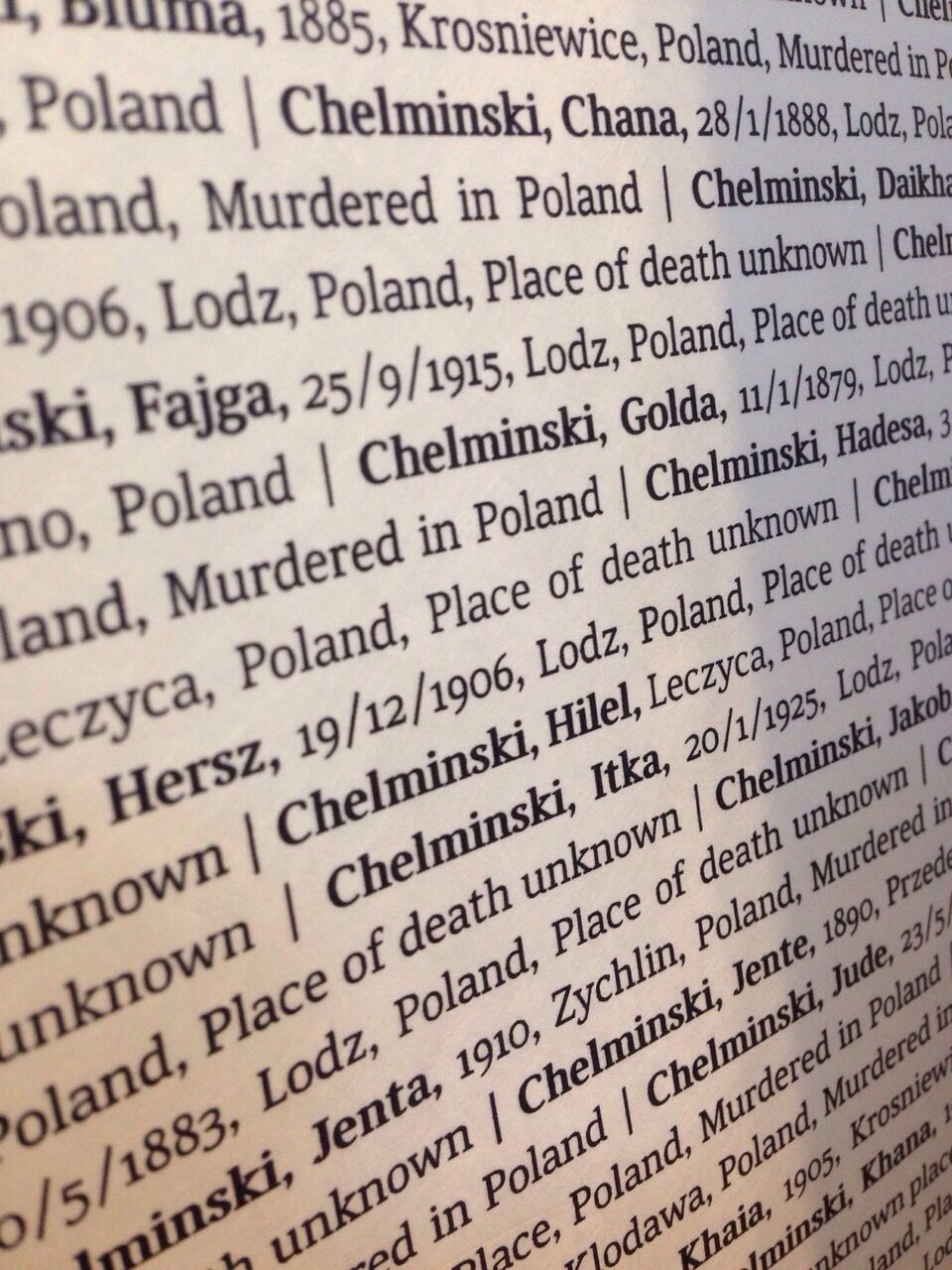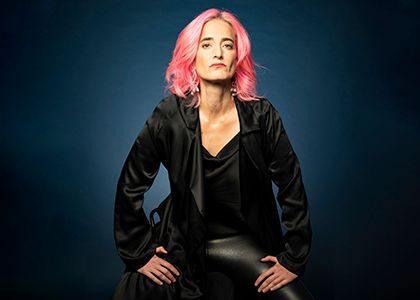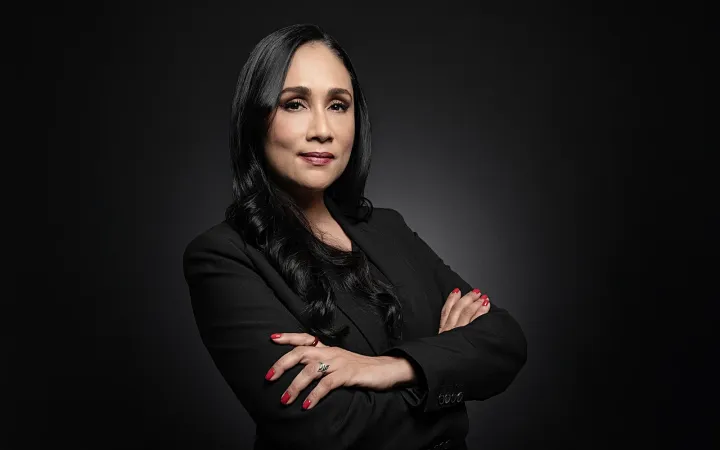En el 2012 mi hija fue a Polonia a conocer los Campos de Concentración de exterminio Nazi. Ahí, en medio del horror, hay una pared con los nombres de los asesinados. Chelminsky Jana, Chelminsky Dahika, Chelminsky Golda, Chelminsky Hilel (homónimo de mi papá), Chelminsky Itka. Chelminsky Jakob, Chelminsky, Chelminsky, Chelminsky, Chelminsky…

Es innegable que para los judíos, sobre todo los que nacimos en el siglo 20, que somos hijos o nietos de contemporáneos del Holocausto, el sentimiento que nos genera el tema tiene una connotación diferente de lo que es para el resto de la humanidad. Más cruda, más real, más personal. Cuando yo crecí, las heridas históricas, no que nunca sanen, todavía supuraban.
A las personas no judías, incluso las más empáticas, humanas y judeo-fílicas, el tema les llega de manera diferente. No menos trágico pero menos personal.
Para algunos es una página terrible en un libro de historia, para nosotros es un tatuaje en el ADN.
Conforme pasan los años el tema del Holocausto empieza a perder relevancia en la cultura colectiva mundial. Mucho más allá de los negacionistas y revisionistas históricos, para la gente de a pie el escozor del tema y lo inverosímil de la tragedia se empieza a desvanecer. Una tragedia entre tantas. Este año se cumplen 78 años de la liberación de Auschwitz. Una eternidad en este mundo de inmediatez. Tan historia antigua como historia antigua son Las Cruzadas o el descubrimiento de América. Material de un examen. No material vigente de reflexión y de acción.
Siempre asumimos que el Holocausto es una tragedia universal y cuyas lecciones iban a ser perpetuas e inamovibles.
Craso error
Porque sí, el Holocausto Judío es, sin duda, una tragedia de toda la humanidad (la peor) pero sus lecciones no han “envejecido bien”. Se oyen repetitivas y su impacto en el presente se minimiza.
Salvo algunas honrosas excepciones, no hemos podido “modernizar” lo que tenemos que saber del Holocausto para que siga teniendo la vigencia, impacto y relevancia que se necesita en el mundo actual.
¿Sigue siendo vigente hablar del Holocausto? ¿O se ha vuelto un tema de franca hueva?
¿Pueden los no judíos empatizar hoy con la tragedia que ocurrió en “un lugar muy lejano hace mucho tiempo”? ¿Pueden los jóvenes judíos que lo llevan en la sangre pero que tienen esta lejanía temporal, encontrar la relevancia que tiene en la historia del pueblo judío y de ellos mismos? ¿PODEMOS SEGUIR ENCONTRANDO LECCIONES EN LA TRAGEDIA QUE SEAN VIGENTES Y QUE NOS DEN PAUTA PARA CONVERTIRNOS EN UNA MEJOR SOCIEDAD?
El Holocausto Judío ha perdido relevancia porque las lecciones tradicionales, que creíamos englobaba, se han vuelto anacrónicas en la vida moderna.
Sí, la teoría sigue siendo la misma (los datos y números y fechas y “soluciones” y nombres) y es fundamental tener una idea básica y real sobre lo que pasó, pero la práctica, lo que debemos realmente comprender del tema para dar paso a la acción, tiene que ser diferente.
La lección básica del Holocausto siempre ha sido:
“Quien no conoce la historia está condenado a repetirla, nunca jamás”.
¿Cómo puede ser el grito de recuerdo “Nunca Jamás” si desde 1945, que acabó la guerra, hemos visto miles y miles de tragedias que quizá no son iguales en la escala pero que copiaron e incluso “mejoraron” los exterminios sistemáticos? ¿Cómo podemos hablar de “Nunca Jamás” en un mundo plagado de discursos de odio y de discriminación y de asesinatos por razones de género, religión, preferencias? ¿Cómo podemos hablar de “Nunca Jamás” si somos partícipes o cómplices silenciosos de los terrores del mundo?
Sí, damas y caballeros, aun conociendo la historia somos capaces de repetirla. Peor aún, somos capaces de empeorarla.
Porque el grito de Nunca Jamás, hoy se queda corto. Es “wishful thinking”, pensamiento mágico. Como si las cosas ocurrieran o dejaran de ocurrir por generación espontánea.
El Nunca Jamás no hace énfasis en la acción individual y la responsabilidad que TODOS Y CADA UNO DE NOSOTROS tenemos que asumir para que estas tragedias paren.
(Odio citar a Arjona pero) El Holocausto Judío va a mantener su relevancia en la historia de la humanidad sólo si se convierte en verbo, no sustantivo.
Y para mí, hoy, aquí y ahora, la lección más importante y relevante del Holocausto, lo que tenemos que enfatizar junto con la magnitud de la tragedia, fue la existencia de “upstanders”, de miles de personas que escondieron, ayudaron, salvaron, alimentaron y actuaron en contra del régimen nazi.
Puede ser que hayan sido una cantidad mínima en comparación con los “bystanders”, aquellos que no hicieron nada, pero existieron y salvaron vidas e hicieron un cambio. Héroes que son el ejemplo de lo mejor del espíritu humano.
No sólo los “famosos” como Oskar Schindler o Raoul Wallenbreg o Irena Sandler, sino las miles y miles de personas gentiles anónimas, de a pie, que salvaron vidas, muchas veces poniendo la suya en peligro, porque era lo humanamente correcto.
Eso es algo que hoy, en un mundo tan cruel y convulso, todos y cada uno de nosotros podemos, DEBEMOS, hacer.
La magnitud de la tragedia del Holocausto judío sigue y seguirá siendo inconmesurable, pero su diatriba en la vida actual tiene que cambiar.
La lección ya no es “Aquel quien no conoce la historia es capaz de repetirla. Nunca Jamás”. Sino “AUN conociendo la historia somos capaces de repetirla, pero está en MI que nunca jamás a nadie esto vuelva a suceder”.
Las opiniones expresadas son responsabilidad de sus autoras y son absolutamente independientes a la postura y línea editorial de Opinión 51.
Más de 150 opiniones a través de 100 columnistas te esperan por menos de un libro al mes. Suscríbete a Opinión 51.





Comments ()